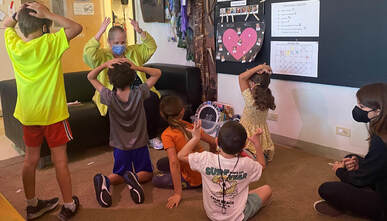|
By Barb Shimansky, Director of the School for Living Judaism, Temple Beth Sholom, Miami Beach, FL  When we decided to adopt the #OnwardHebrew philosophy at Temple Beth Sholom in Miami Beach, Florida for the 2018-2019 school year, we knew this would be a shock to the system. Hebrew had been taught in a “traditional Hebrew School” manner for decades. Classes were held twice a week for grades three through six, and learners spent most of this time sitting at tables and going around the room to read lines from primers and workbooks. There would be occasional deviations for things like holiday vocabulary. Learners were certainly learning to read Hebrew, but they were uninspired and unengaged. The relatively new #OnwardHebrew approach changed both the methodology and the narrative by which Hebrew could be taught, and we eagerly jumped “all in.” That is not to say that our constituents were necessarily so eager. Although there was expressed desire for our learners to have a more enjoyable experience, parents were generally uneasy about the idea of their children learning Hebrew differently. While I anticipated this, the pushback was pretty intense during the first year or two. The summer before we launched, a parent called me and said, “I have some questions for you about this Hebrew School where you won’t be teaching Hebrew anymore.” Caught somewhat off-guard, I took a moment before responding, “We will still be teaching Hebrew. It will just be done differently from how we have been doing it.” It turned out that it was not just this one parent who had the impression that we were abandoning Hebrew altogether. This was the rumor going around the community! I realized we needed to communicate differently if our families were going to buy-in to this approach. I will freely acknowledge that the change in my language around this was not one that occurred overnight. In fact, I continue to think about this and continually refine it. Perhaps the most effective thing I can emphasize it that I talk about what we DO, not what we DON’T do. I offer here some of the main points that I try to emphasize when speaking to parents. Overall Philosophy
Framing these conversations with parents in the positive and maintaining ongoing communication with them about what is happening with Hebrew education have been invaluable tools in elevating the success of #OnwardHebrew in our setting. I hope these tips and examples can be helpful to you, regardless of where you are in the #OnwardHebrew journey!
0 Comments
|
AuthorSAll of us! If you have something to contribute, send your posting via the Contact webpage! Archives
September 2023
Categories
All
|
 RSS Feed
RSS Feed